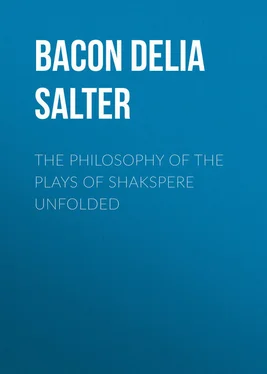Delia Bacon - The Philosophy of the Plays of Shakspere Unfolded
Здесь есть возможность читать онлайн «Delia Bacon - The Philosophy of the Plays of Shakspere Unfolded» — ознакомительный отрывок электронной книги совершенно бесплатно, а после прочтения отрывка купить полную версию. В некоторых случаях можно слушать аудио, скачать через торрент в формате fb2 и присутствует краткое содержание. Жанр: literature_19, foreign_antique, foreign_prose, на английском языке. Описание произведения, (предисловие) а так же отзывы посетителей доступны на портале библиотеки ЛибКат.
- Название:The Philosophy of the Plays of Shakspere Unfolded
- Автор:
- Жанр:
- Год:неизвестен
- ISBN:нет данных
- Рейтинг книги:3 / 5. Голосов: 1
-
Избранное:Добавить в избранное
- Отзывы:
-
Ваша оценка:
- 60
- 1
- 2
- 3
- 4
- 5
The Philosophy of the Plays of Shakspere Unfolded: краткое содержание, описание и аннотация
Предлагаем к чтению аннотацию, описание, краткое содержание или предисловие (зависит от того, что написал сам автор книги «The Philosophy of the Plays of Shakspere Unfolded»). Если вы не нашли необходимую информацию о книге — напишите в комментариях, мы постараемся отыскать её.
The Philosophy of the Plays of Shakspere Unfolded — читать онлайн ознакомительный отрывок
Ниже представлен текст книги, разбитый по страницам. Система сохранения места последней прочитанной страницы, позволяет с удобством читать онлайн бесплатно книгу «The Philosophy of the Plays of Shakspere Unfolded», без необходимости каждый раз заново искать на чём Вы остановились. Поставьте закладку, и сможете в любой момент перейти на страницу, на которой закончили чтение.
Интервал:
Закладка:
'And could the perfection of eloquence have added any lustre proportionable to the merit of a great person, certainly Scipio and Laelius had never resigned the honour of their comedies, with all the luxuriancies and delicacies of the Latin tongue , to an African slave, for that the work was THEIRS its beauty and excellency SUFFICIENTLY PROVE.' [This is from a book in which the supposed autograph of Shakspere is found; a work from which he quotes incessantly, and from which he appears, indeed, to have taken the whole hint of his learning.] 'Besides Terence himself confesses as much, and I should take it ill in any one that would dispossess me of that belief .' For, as he says in another place, in a certain deeply disguised dedication which he makes of the work of a friend, a poet, whose early death he greatly lamented, and whom he is 'determined,' as he says, 'to revive and raise again to life if he can:' 'As we often judge of the greater by the less, and as the very pastimes of great men give an honourable idea to the clear-sighted of the source from which they spring, I hope you will, by this work of his, rise to the knowledge of himself, and by consequence love and embrace his memory. In so doing, you will accomplish what he exceedingly longed for whilst he lived.' But here he continues thus, 'I have, indeed, in my time known some, who, by a knack of writing, have got both title and fortune, yet disown their apprenticeship, purposely corrupt their style, and affect ignorance of so vulgar a quality (which also our nation observes , rarely to be seen in very learned hands ), carefully seeking a reputation by better qualities.'
I once did hold it, as our statists do, a baseness to write fair: but now it did me yeoman's service.
– Hamlet.And it is in the next paragraph to this , that he takes occasion to mention that his stories and allegations do not always serve simply for example, authority, or ornament; that they are not limited in their application to the use he ostensibly makes of them, but that they carry, for those who are in his secret, other meanings, bolder and richer meanings, and sometimes collaterally a more delicate sound. And having interrupted the consideration upon Cicero and Pliny, and their vanity and pitiful desire for honour in future ages, with this criticism on the limited sphere of statesmen in general, and the devices to which Lælius and Scipio were compelled to resort, in order to get their plays published without diminishing the lustre of their personal renown, and having stopped to insert that most extraordinary avowal in regard to his two-fold meanings in his allegations and stories, he returns to the subject of this correspondence again, for there is more in this also than meets the ear; and it is not Pliny , and Cicero only, whose supposed vanity, and regard for posthumous fame, as men of letters, is under consideration. 'But returning to the speaking virtue ;' he says, 'I find no great choice between not knowing to speak anything but ill , and not knowing anything but speaking well . The sages tell us, that as to what concerns knowledge there is nothing but philosophy , and as to what concerns effects nothing but virtue , that is generally proper to all degrees and orders. There is something like this in these two other philosophers, for they also promise ETERNITY to the letters they write to their friends, but 'tis after another manner , and by accommodating themselves for a good end to the vanity of another ; for they write to them that if the concern of making themselves known to future ages, and the thirst of glory, do yet detain them in the management of public affairs, and make them fear the solitude and retirement to which they would persuade them; let them never trouble themselves more about it, forasmuch as they shall have credit enough with posterity to assure them that, were there nothing else but the letters thus writ to them, those letters will render their names as known and famous as their own public actions themselves could do. [And that — that is the key to the correspondence between two other philosophers enigmatically alluded to here.] And besides this difference,' for it is 'these two other philosophers,' and not Pliny and Cicero, and not Seneca and Epicurus alone, that we talk of here, 'and besides this difference, these are not idle and empty letters, that contain nothing but a fine jingle of well chosen words, and fine couched phrases; but replete and abounding with grave and learned discourses , by which a man may render himself – not more eloquent but more wise , and that instruct us not to speak but to do well '; for that is the rhetorical theory that was adopted by the scholars and statesmen then alive, whose methods of making themselves known to future ages he is indicating, even in these references to the ancients. ' Away with that eloquence which so enchants us with its harmony that we should more study it than things '; for this is the place where the quotation with which our investigation of this theory commenced is inserted in the text, and here it is, in the light of these preceding collections of hints that he puts in the story first quoted, wherein he says, the nature of the orator will be much more manifestly laid open to us, than in that seeming care for his fame, or in that care of his style, for its own sake. It is the story of Eros, the slave, who brought the speaker word that the audience was deferred , when in composing a speech that he was to make in public, 'he found himself straitened in time , to fit his words to his mouth as he had a mind to do.'
CHAPTER III
Is the storm overblown? I hid me under the dead moon-calf's gaberdine for fear of the storm.
– Tempest.BUT as to this love of glory which the stoics, whom this philosopher quotes so approvingly, have measured at its true worth; as to this love of literary fame, this hankering after an earthly immortality, which he treats so scornfully in the Roman statesman, let us hear him again in another chapter, and see if we can find any thing whereby his nature and designs will more manifestly be laid open to us. 'Of all the foolish dreams in the world,' he says, that which is most universally received, is the solicitude of reputation and glory, which we are fond of to that degree as to abandon riches, peace, life, and health, which are effectual and substantial good, to pursue this vain phantom. And of all the irrational humours of men, it should seem that the philosophers themselves have the most ado, and do the least disengage themselves from this the most restive and obstinate of all the follies. There is not any one view of which reason does so clearly accuse the vanity, as that; but it is so deeply rooted in us , that I doubt whether any one ever clearly freed himself from it, or no. After you have said all, and believed all that has been said to its prejudice, it creates so intestine an inclination in opposition to your best arguments , that you have little power and firmness to resist it; for ( as Cicero says ) even those who controvert it, would yet that the books they write should appear before the world with their names in the title page , and seek to derive glory from seeming to despise it. All other things are communicable and fall into commerce; we lend our goods —
Читать дальшеИнтервал:
Закладка:
Похожие книги на «The Philosophy of the Plays of Shakspere Unfolded»
Представляем Вашему вниманию похожие книги на «The Philosophy of the Plays of Shakspere Unfolded» списком для выбора. Мы отобрали схожую по названию и смыслу литературу в надежде предоставить читателям больше вариантов отыскать новые, интересные, ещё непрочитанные произведения.
Обсуждение, отзывы о книге «The Philosophy of the Plays of Shakspere Unfolded» и просто собственные мнения читателей. Оставьте ваши комментарии, напишите, что Вы думаете о произведении, его смысле или главных героях. Укажите что конкретно понравилось, а что нет, и почему Вы так считаете.












